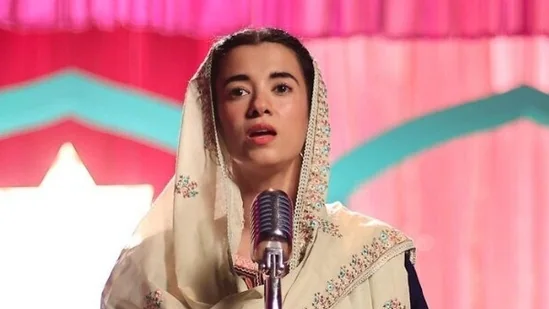Lost Songstress:
The life of Kashmiri singer Raj Begum is the subject of Songs of Paradise—a partly fictionalized biopic– directed and co-written by Danish Renzu. The singer, named Noor Begum in the film, is a legend in Kashmir, but barely known outside the state. The film not just captures the simple lyricism of her songs, sung in her sweet, girlish voice, but also the struggles she had to face in a conservative society, in which women were not allowed to perform in public.
The older Noor Begum (Soni Razdan) narrates her story to a music researcher and fan, Rumi (Taaruk Raina), impressed by his eagerness and persistence. Born Zeba (the younger version played by Saba Azad) to a poor tailor (Bashir Lone) and his sharp-tongued wife (Sheeba Chaddha), she works as a domestic helper in the home of a music teacher (Shishir Sharma). The teacher hears her singing at a friend’s wedding, and bewitched by her voice, offers to train her. She has to hide this from her mother and neighbours, because of social disapproval. Her mother is planning to get her married to an older man with three children.
Encouraged by her guru, she enters a Radio Kashmir singing competition and wins. The first female singer with Radio Kashmir, at a time (in the 1950s) when men believed women were only meant to sing in the fields or croon lullabies, as a character comments. The quaint Radio Kashmir premises did not even have a toilet for females, because no women were employed there.
The anxious-looking young woman, however, has the nerve to demand equal pay, and later, credit for the musicians. An Oxford-returned poet, Azad (Zain Khan Durrani) falls in love with her, and after the scandal caused by their photo published in a newspaper, he marries her. The real life singer’s husband is not even mentioned in her obituaries (she died at age 89 in 2016), but making him a progressive poet and romantic, goes with the filmmaker’s zeal to project Noor as a “revolutionary,” who paved the way for other women singers in Kashmir. A character of Azad’s aunt from Delhi (Lillete Dubey) has been created, just so that she can speak some encouraging get-wings-and-fly kind of platitudes. The film does put Noor’s contribution in perspective by naming Sufi-inspired female poets like Habba Khatoon and Lal Dedh, as well as her peers and contemporaries like Lata Mangeshkar, Noorjehan and Mubarak Begum. If Raj/Noor Begum ever tried her luck in the movies, the film or material available about her on the net does not say.
Saba Azad gives Noor the right mix of innocence and spirit, which Soni Razdan picks up later as an outspoken woman who knows the value of her talent. A lot of the actors in the film are Kashmiri, and the ones who are not, have also made the effort to pick up the dialect.
Songs of Paradise is an earnest, simple film, set against the stunning beauty (brought to life by Vincenzo Condorelli’s camera) of Kashmir—the story of a female achiever, that needed to be told, just as her songs of love and longing deserve to be rediscovered and shared with music aficionados.
(This piece first appeared in rediff.com)

